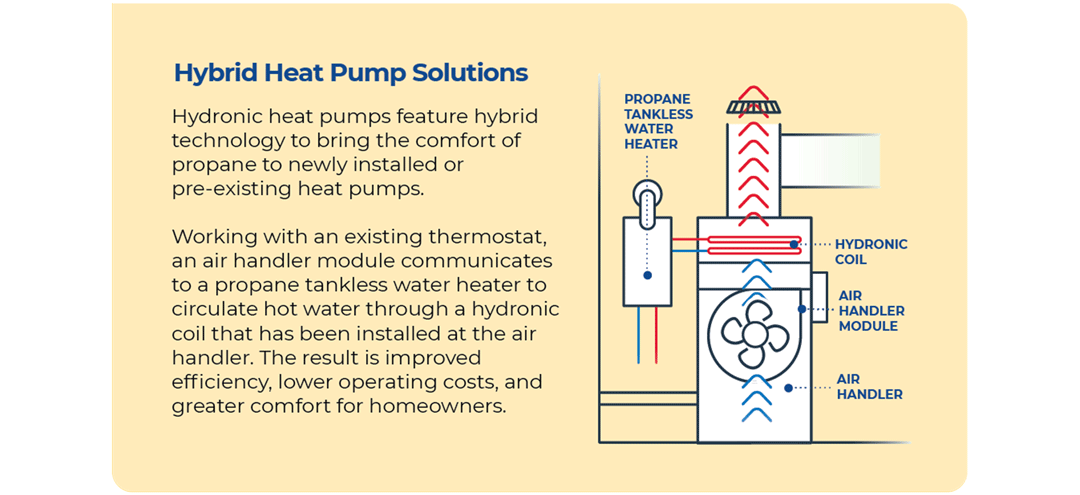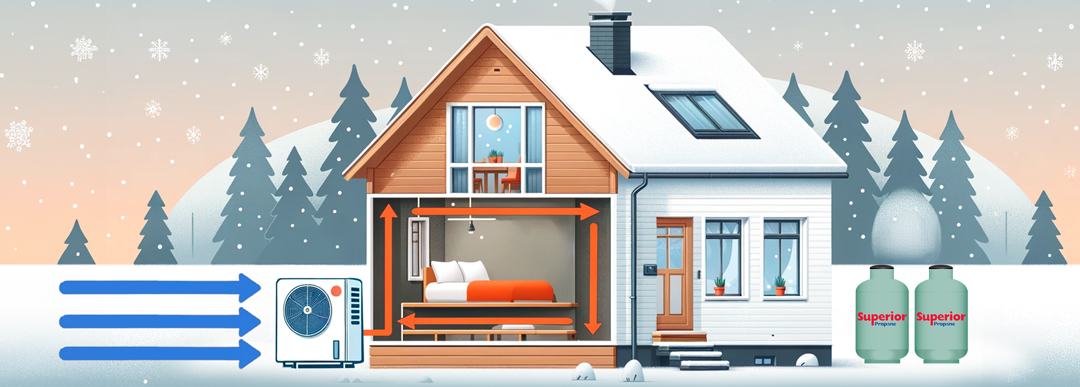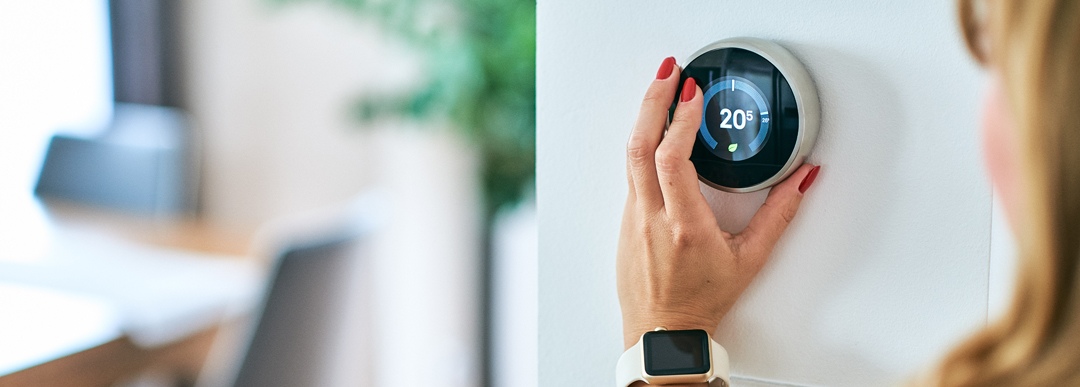Heat Pumps in Canada:
Are they a Good Choice for Your Needs?
Heat pumps have grown in popularity due to government incentives and programs, but are they the right solution for your energy needs and can they perform in extreme Canadian weather? Learn more about heat pumps and their uses, limitations, and possible solutions.
Navigating the Reality of Heat Pumps in Canadian Climates
Have you installed a heat pump in your home hoping for a winter-proof heating solution, only to find it struggling against Canada's harsh winter temperatures? Or perhaps you're contemplating the switch to a heat pump system but are wary of its performance during the coldest months of the year. Heat pumps are known for their energy efficiency and environmental benefits, yet in Canada's extreme winter conditions, they often fall short of expectations.
Electric Heat Pumps: Limitations in Cold Climates
When temperatures drop, heat pumps frequently need to rely on a backup system to maintain indoor warmth. An electric heating element takes over when temperatures are outside the capacity range of heat pumps, meaning the system will simply use electricity to produce heat and therefore has no efficiency benefit. The backup heating element can increase the heat pump's electricity consumption. Such a spike in electricity usage not only may cause additional wear and tear on the back-up system, and therefore cause earlier replacement of components, but also can inflate your electricity bill and intensify demand on the power grid.
Comparing Electric Heat Pump Efficiency: Advantages and Challenges
The effectiveness of heat pumps varies significantly across the diverse climates of Canada, presenting a unique set of challenges depending on your location, local climate, and reliability to energy sources, such as electricity. Let’s explore some benefits and limitations heat pumps may present:
ADVANTAGES |
LIMITATIONS |
|---|---|
|
Energy Efficiency: |
Factors can Compromise Efficiency: |
|
Some Cold-Weather Improvements: There have been some advances in technology that have improved their cold-weather functionality. |
Backup Heat Source May Be Required: |
|
Government Rebates: |
Initial Investment and Maintenance Costs: |
|
Versatility: |
Shorter lifespan and increased maintenance: |
In cold weather, a heat pump can move heat from the cool outdoors to warm a house; the pump may also be designed to transfer heat from the house to the outdoors in warm weather. Shown in this image is an air source heat pump. Other models include ground source heat pumps and hydronic heat pumps. Any of these models can be made into a hybrid solution using propane as a back-up source to offer consistent, reliable, seamless comfort in colder weather when traditional heat pumps become less efficient.
Hybrid Heat Pump Addresses Heat Pump Limitations
Heat pumps could certainly be part of Canada's diverse landscape for heating solutions, but in order for this solution to be seamless, efficient, reliable and cost-effective, consumers should consider ways to optimize their heat pump in order to take full advantage of its benefits.
This is where hybrid heat pumps and propane come into play. Propane, a high-efficiency, cost-effective and independent energy source, allows homeowners to significantly enhance their heat pump system efficiency and reliability, even in Canada's challenging winters. This solution ensures that heat pumps can deliver consistent warmth and comfort throughout the winter, overcoming the limitations presented by electric heat pump systems.
What is a Hybrid Heat Pump?
A hybrid heat pump is an advanced heating solution that combines the efficiency of electric heat pumps with the power of propane heating. Hybrid heat pumps optimize a home’s reliability and energy efficiency with the heat pump as the main heat source and low-emission propane as the backup source. The heat pump switches to the propane powered system in colder temperatures when the unit would normally struggle and drive-up energy bills due to the additional effort to produce the adequate level of heat. Hybrid heat pumps ensure consistent, comfortable indoor temperatures even during the coldest winter months, making them a versatile and efficient choice for Canadian homeowners.
Benefits of Hybrid Heat Pumps:
There are multiple benefits of introducing a hybrid heat pump to your home’s electric heating system. Hybrid heat pumps, adaptable to both retrofits and new construction, enhance efficiency, reduce dependency on electricity, and offer consistent comfort in extreme weather when traditional heat pumps efficiency begins to decline.
These systems seamlessly integrate with any home using an electric heat pump, ensuring reliable heating when temperatures drop by combining the strengths of electric and propane heating, providing a seamless transition between energy sources based on temperature and efficiency. This approach guarantees warmth and efficiency, as well as improves cost-efficiency and ensures your home maintains desired temperatures year-round.
Hybrid Heat Pump Solutions:
-
Comfortable Home Heating:
Hybrid heat pump systems offer quick, even heating, avoiding the overly dry air associated with electric heat strips, thus maintaining a comfortable indoor environment.
-
Cost-Efficiency:
Hybrid heat pump solutions can significantly lower operating costs compared to all-electric systems by leveraging the efficiency of heat pumps in moderate climates and switching to propane when temperatures drop. This strategic use of energy sources ensures heating is achieved more efficiently by using more than a single source, directly translating to savings on utility bills. The efficiency of propane as a backup source enhances the system's performance in cold weather without the high costs associated with electric heating, making hybrid systems a cost-effective choice for homeowners.
-
Energy Efficiency:
Hybrid heat pump solutions are more energy efficient, as they optimize and redirect energy use, reducing reliance on the electricity grid, which allows for lower energy bills. These systems facilitate a smooth transition to propane heating, ensuring continued warmth without electricity dependency. Additionally, they can be integrated with existing heat pumps to either collaborate with them, as seen with hydronic heat pumps, or serve as backup systems, offering flexibility and improved heating performance.
-
Adaptability:
Hybrid propane heat pumps exemplify adaptability in modern heating technologies. By incorporating propane, these systems ensure efficient and reliable heating across a wide range of temperatures, offering a robust solution for homes in varying climates. This adaptability not only enhances comfort but also ensures that your heating system can meet your specific needs without overdependence on a single energy source, making it a flexible choice for homeowners seeking efficient, reliable warmth.
The Difference Between a Propane Furnace, a Heat Pump & Hybrid Heat Pump System:
Understanding the differences between furnaces, traditional heat pumps, and hybrid systems is crucial when selecting the right home heating solution for your household. Let’s explore the differences between systems.
Propane Furnaces: Efficient and Reliable Home Heat:
Propane furnaces stand out as the top choice for homeowners looking to save money on their energy bills, while having comfortable and reliable heat in their homes. Due to the properties of propane as a fuel, propane furnaces offer higher energy efficiency when compared to other fuels such as oil or natural gas furnaces. Propane has a higher energy output by unit of fuel, which means it spends less fuel to produce the same amount of energy and heat. Additionally propane furnaces do not require maintenance services as often as other types of furnaces. All these benefits make propane furnaces one of the most cost-effective heating solutions, while maintaining a reliable and comfortable heat level for your home.
Types of Hybrid Heat Pumps:
-
Hydronic Heat pumps - The Heat Pump Helper system:
Hydronic heat pumps combine a propane-powered tankless water heater with the heat pump to efficiently heat your home. Also known as “the Heat Pump Helper” this system pairs with a propane tankless water heater to circulate hot water through a hydronic coil which transfers heat evenly and efficiently throughout the home for warmth. The use of propane to heat the water is highly efficient, providing a method to distribute heat throughout the home. This integration ensures consistent indoor warmth when the temperatures outside fall outside the efficient operating range of an electric heat pump on its own.

-
Air Source Heat Pumps (ASHPs) Paired with Propane Heating:
Air Source Heat Pumps efficiently regulate home temperatures by extracting warmth from the outdoor air. However, their ability to heat effectively diminishes in extremely cold conditions due to the increased energy required to warm the colder air. At this point, the home heating system can switch to propane as a secondary heat source. The system incorporates a propane furnace or heating unit that activates when the air temperature drops too low for the ASHP to operate efficiently. The propane heater generates warmth itself, bypassing the need to extract heat from the cold air to ensure continuous and efficient heat that maintains a comfortable indoor environment regardless of the outside air temperature, offering a more resilient and adaptive climate control solution for homes.
-
Ground Source Heat Pumps (GSHPs) Paired with Propane Heating:
Ground Source Heat Pumps (GSHPs) leverage the earth's constant subterranean temperatures for heating, cooling, and hot water provision. However, in Canada’s cold temperatures, the demand for heat can exceed the available underground energy and what these geothermal units can provide, which is when these systems benefit from using propane’s high energy output as a backup fuel, providing a high-efficiency, immediate heat source through a propane-fueled boiler or furnace, seamlessly integrating with the GSHP to enhance heating capacity and ensure consistent indoor comfort without significant electrical consumption.
Electric Heat Pumps:
Traditional heat pumps rely on the ambient air or ground to extract heat and circulate it in your home. They can be very efficient in mild climates, however they become less efficient when exposed to colder temperatures during the Canadian winter months, as they can work too hard to bring heat into the home, resulting in lower performance, higher operational costs and reduced comfort, which can defeat their purpose.One of the main benefits of heat pumps is that they can have a dual function, being able to circulate heat in a home or extract the heat during warmer months, however they may require more maintenance.
How to add a hybrid heat pump to your existing heat pump system?
Hybrid heat pumps are becoming popular across the country. An existing heat pump can be retrofitted to become a hybrid system that seamlessly introduces propane as a backup source to improve their performance. These systems are offered by our residential partners, for both sale and maintenance/servicing of your hybrid heat pump system. Contact us or fill the form below to enquire.
« Click to return to the main blog page.
Contact Us to Make the Switch

OR
Call Us Now at
1-855-540-7295





